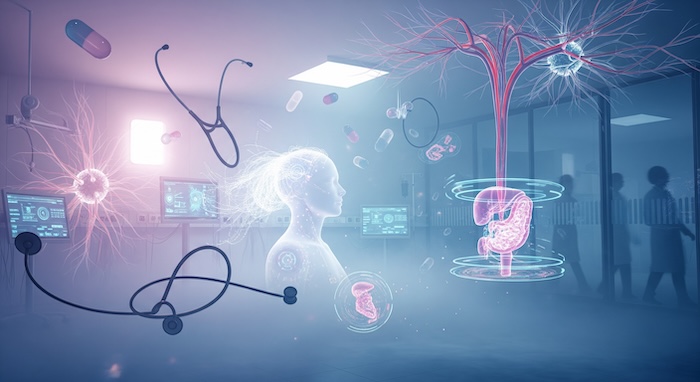Artificial Intelligence (AI) in Healthcare: Transforming treatment and care

Imagine a world where diseases are detected before symptoms manifest, treatments are tailored to your unique genetic makeup, and healthcare workflows run with unprecedented efficiency. This isn't science fiction; it's the burgeoning reality powered by Artificial Intelligence, a force poised to transform every facet of medicine fundamentally.
AI's Expanding Role in Healthcare
Artificial Intelligence and machine learning are no longer futuristic buzzwords, but increasingly integral components of modern healthcare. Its potential to revolutionise patient care and health management is immense, touching everything from administrative tasks to complex clinical decision-making (Mayo Clinic Press, Mar 2024). The global artificial intelligence in healthcare market is on a trajectory of explosive growth, projected to soar from nearly $27 billion in 2024 to over $613 billion by 2034 (HealthTech Magazine, Oct 2024). This surge highlights the technology's ability to enhance clinical efficiency, advance research, and improve patient experiences through innovations such as faster diagnoses and robot-assisted surgeries (Built In).
Beyond the clinical frontline, AI is becoming a powerhouse for operational efficiency. It streamlines cumbersome processes such as appointment scheduling and insurance claim processing, thereby reducing administrative burdens (Foreseemed.com). Healthcare organisations are leveraging AI to automate workflows, support data analysis, and boost overall productivity (NetSuite, Oct 2024). By 2025, it's anticipated that AI will manage over 85% of customer interactions in healthcare, significantly reducing the need for human intervention in routine tasks (AAPA, May 2024). This automation is paving the way for a future of connected and AI-augmented care, striving towards the 'quadruple aim' of better outcomes, improved patient experience, enhanced clinician well-being, and lower costs (PMC NCBI).
AI in Medical Diagnostics
The diagnostic arena is where AI's analytical prowess truly shines, acting as a sophisticated co-pilot for medical professionals. AI algorithms can sift through vast quantities of medical imaging data—X-rays, CT scans, and MRIs—with remarkable speed and an ever-improving ability to detect subtle anomalies that might elude human perception. This capability is already helping doctors spot fractures, triage patients more effectively, and detect early signs of diseases (World Economic Forum, Mar 2025). For instance, some medical imaging AI tools have demonstrated accuracy levels exceeding 95% for identifying conditions such as lung cancer and retinal disorders (RamSoft, May 2025).
In specialities like radiology and pathology, AI is not just an assistant but a transformative partner. AI-assisted imaging has exhibited significantly higher diagnostic accuracy compared to conventional radiology in some meta-analyses (ResearchGate Meta-Analysis). A groundbreaking study from Northwestern University, reported in May 2025, revealed that an AI tool boosted radiograph report completion efficiency by an average of 15.5%, with some radiologists achieving gains as high as 40%, all without compromising diagnostic accuracy (Northwestern News, May 2025). The U.S. Food and Drug Administration (FDA) actively maintains a list of authorised AI/ML-enabled medical devices, underscoring the growing regulatory acceptance and real-world deployment of these technologies (FDA). This regulatory oversight is crucial as AI diagnostic tools become more prevalent, ensuring they are both safe and effective.
AI in Personalised Medicine
Personalised medicine, the holy grail of healthcare, aims to tailor treatments to the individual. AI is the key to unlocking this potential at scale. By analysing a patient's unique genetic profile, lifestyle factors, and clinical data, machine learning algorithms can help develop highly individualised treatment plans (BMC Medical Education, Sep 2023). This is particularly revolutionary in oncology, where AI assists in identifying new therapeutic targets, evaluating drug sensitivity, and even optimising radiation doses for cancer treatment (PMC NCBI; Cancer Research Institute, Jan 2025).
The synergy between AI and genomics is compelling. AI models can analyse massive genomic datasets to identify patterns, mutations, and biomarkers indicative of disease susceptibility or predict response to specific therapies (Crown Bio, Dec 2024; CRISPR Medicine News). For instance, AI-driven analysis of electronic health records can uncover hidden patterns across patient populations, predict disease progression, and suggest preventative interventions (Journal of Biomedical Science, Feb 2025). Researchers have successfully used AI to identify genetic changes that directly impact survival outcomes in cancer, paving the way for more precise and effective interventions (USC Viterbi, Feb 2025).
Challenges and Considerations
Despite its transformative potential, the integration of AI into healthcare presents its hurdles. Data quality and accessibility remain significant challenges, as AI models are only as good as the data on which they are trained (Forbes, July 2024). Data security and patient privacy are paramount concerns, necessitating robust frameworks to protect sensitive information (PMC NCBI, Feb 2024). Furthermore, the spectre of algorithmic bias looms large; if AI systems are trained on unrepresentative data, they can perpetuate or even exacerbate existing health disparities (CDC, Aug 2024).
Ethical dilemmas surrounding accountability, transparency in AI decision-making, and informed consent require careful navigation (PMC NCBI). The regulatory landscape is also evolving, struggling to keep pace with rapid technological advancements, which can create barriers to adoption (PMC NCBI). Ensuring that medical professionals receive adequate training and can maintain their clinical skills alongside AI, while also being vigilant against potential AI errors, is crucial for the successful implementation of AI in healthcare (Nature, August 2024; PMC NCBI, November 2024).
The Dawn of a New Era: The Path Forward
The journey of AI in healthcare is an intricate dance between innovation and responsibility. As we stand on the threshold of this new era, the promise is undeniable: a healthcare system that is more predictive, preventative, personalised, and participatory. The key lies in fostering collaboration among AI developers, clinicians, ethicists, and policymakers to ensure that these powerful tools are developed and deployed equitably, safely, and ultimately for the benefit of all patients. The rhythm of progress is quickening, and the symphony of AI in healthcare is just beginning to unfold, promising a healthier future for generations to come.